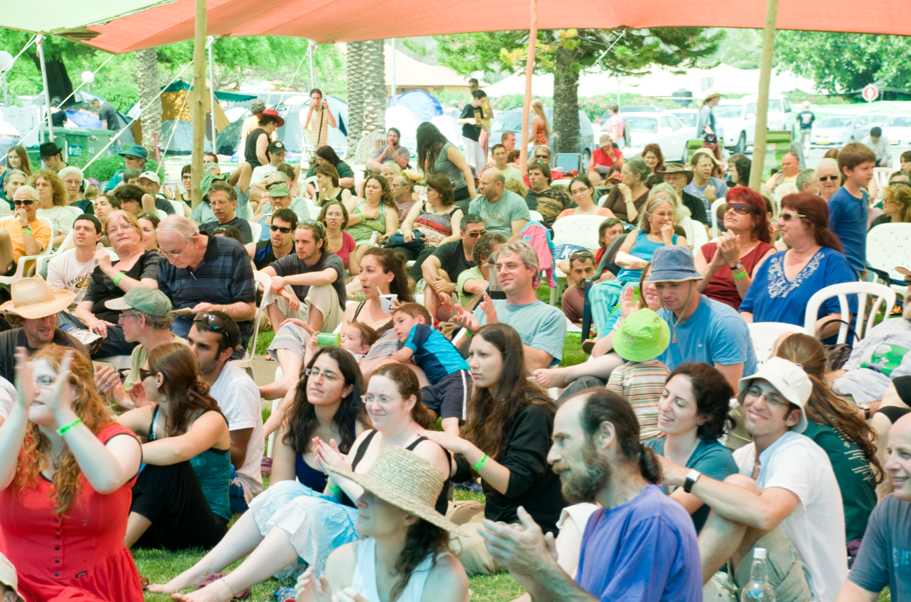When Yehudit Vinegrad took the stage at the close of the Spring 2009 Jacob’s Ladder folk festival and announced that she was stepping down and would, after 33 years, no longer produce the show, a palpable shock and shudder rippled through the crowd.
But then Vinegrad added, with a quiet wink and a touch of theatricality, that the expanse of positive energy she’d felt walking the grounds during the three-day music extravaganza convinced her to stick with it, for another year at least. That year took place this past weekend and it was a blast.
Still, Vinegrad’s dilemma reflects the dichotomous mix that managing Jacob’s Ladder has always been – a passionate labor of love that was at the same time a serious and oftentimes grueling business to run, one that now consists of both the original spring show and a smaller edition in December.
“For the first 15 years, we had no concern for profits,” said Vinegrad, who runs the show together with her husband Menachem. “We just wanted to cover things. Of course, it was much less expensive in those days.”
And, indeed, it was a much simpler time. The first Jacob’s Ladder in 1978 consisted of a single stage in an olive grove on the grounds of Kibbutz Mahanayim to which the Vinegrads had immigrated from England 10 years earlier. At that inaugural event, attendees had to dig holes in the grass for toilets.
Over the years, as the festival wandered between kibbutzim and national parks in the north of the country, attendees began to demand more creature comforts. Kibbutz Nof Ginosar, Jacob’s Ladder’s home since 2003, has satisfied that need…but at a cost.
There are now four main performance areas, each of which needs a stage manager, equipment and a sound technician. Food stalls allow hungry revelers to chow down without needing to pack a cooler full of weekend grub. Visitors can get massages or drink tea in the “chai tent.” High-end portable toilets (rather than chemical porta-potties) and hot showers need to be rented, and first aid must to be on hand.
There are parking lot attendants and security personnel, all of whom need to be paid. In addition to camping, Jacob’s Ladder now includes the option to stay in the kibbutz hotel – the ultimate lap of luxury.
And then there are the tarps. Over the years, the Vinegrads have spent a lot of time visiting folk festivals overseas and one of the things Yehudit noticed was the lack of shade. “There would be thousands of people and no shade at all,” she explained. Of course, the tarps that cover much of the central lawn area at Jacob’s Ladder don’t come cheap either.
Jacob’s Ladder has evolved into a full-time job for the Vinegrads, and it’s doubtful the festival could exist without them. “Not a day goes by the entire year that I’m not dealing with something having to do with the festival,” Vinegrad said.
But does that make for good business? Vinegrad wouldn’t say how much the festival earns, but admitted that at the end of the day she and her husband took home not much more than a minimum wage salary. Menachem still works part time as a teacher.
The couple keeps expenses low by running Jacob’s Ladder out of the downstairs of their modest two-floor home in the small town of Katzrin on the Golan Heights. They are assisted by an army of enthusiastic volunteers.
They also don’t pay most of the performers. Headliners from outside of Israel will generally receive airfare, room and board (“plus two trips around Israel – one to Jerusalem and one in the North,” Vinegrad said).
The festival attracts top-notch talent in part because it’s perceived as being one of the better-run, more intimate shows on the international folk scene. Plus, it’s in Israel, which is always a draw.
For example, the headliners for 2007 and 2008 were the evangelical Abrams Brothers, a pair of teenage bluegrass and gospel singers who came from Canada with their extended family. They positively gushed about their relationship to the Holy Land. This year, the primetime entertainment was the Celtic/Americana band Henri’s Notions.
This article first appeared in the Jerusalem Post last week, website prior to the Spring 2010 festival, and caused quite a stir: Vinegrad told me that a number of attendees who had read the article cornered her and asked whether this would be the last Jacob’s Ladder. That prompted Vinegrad to take to the stage and demonstratively declare that Jacob’s Ladder would most definitely continue. Ah, the power of the press!
There’s lots more about Jacob’s Ladder from my friend and colleague David Brinn, as well as a review of the music I liked. Here are the links:
My review of the music.
David’s review of the festival.
David’s reaction to the atmosphere at the show.
My first article on Jacob’s Ladder from 2008.
For more information about upcoming Jacob’s Ladders, visit the website: http://www.jlfestival.com.



{ 2 trackbacks }